What Powers Do UK Private Investigators Have?
May 2, 2022 - Reading time: 9 minutes
Updated on: September 4, 2025
As one of the UK's leading detective agencies, we regularly encounter misconceptions about the powers and services of private investigators. TV shows and films often portray our work dramatically, which leads to public misunderstandings about what we can actually do under UK law.
This article clears up the myths and explains what private investigators in the UK can – and cannot – do.
Can private investigators arrest people?
No. UK private investigators have no special powers of arrest. Our rights and responsibilities are the same as any member of the public.
Do private investigators carry badges?
Some investigators carry ID cards or company-issued badges to confirm their role. This is not legally required, but reputable agencies provide proof of identity when asked.
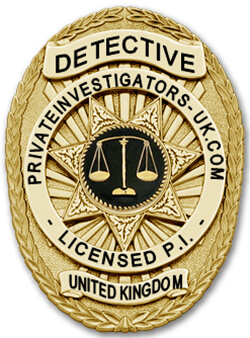
Can private investigators hack into social media accounts?
No. Hacking into private accounts, emails, or phones is illegal. What we can do is OSINT (Open-Source Intelligence): investigating using information already in the public domain. This might include checking dating profiles, finding secondary social media accounts, or linking public data leaks with names and emails.
Can private investigators follow people?
Yes, surveillance is legal provided it does not become harassment or trespass. It is often used for:
- Suspected infidelity
- Personal injury claim verification
- Hidden asset checks in divorce
- Corporate investigations like workplace theft or fly tipping
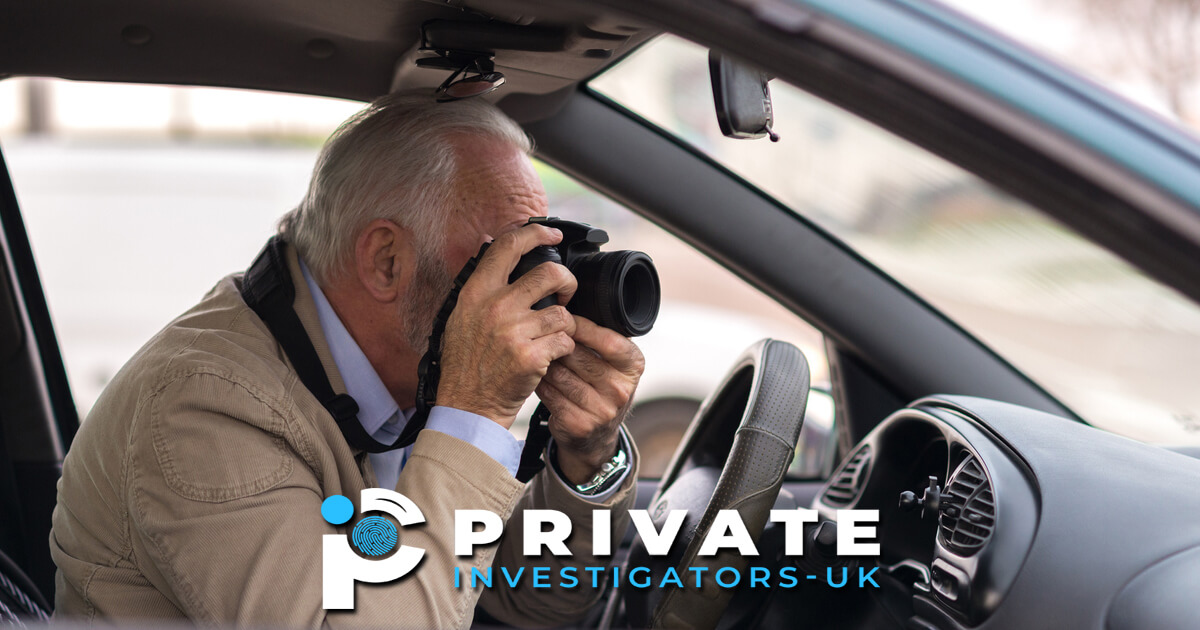
Can private investigators gather evidence?
Yes. Evidence gathering is a core service. Properly collected photographs, logs, and witness statements can be vital in court or private disputes. Investigations are carried out impartially and documented to professional standards.
Can private investigators install GPS trackers?
Yes, usually where the client owns or jointly owns the vehicle. GPS trackers provide live data so investigators know when and where to focus surveillance. This reduces costs and captures stronger evidence. Learn more about GPS trackers here.
Can private investigators install or detect bugs?
This is a sensitive area. In some cases it may be lawful to install hidden microphones or cameras - but only after a careful case review. Every situation must undergo what’s known as a Legitimate Interest Assessment (LIA) before any such device is considered. This ensures the deployment is proportionate, justified, and compliant with UK privacy laws.
For more detailed guidance, see our article: Are Hidden Listening Devices Legal in the UK?
Separately, we also offer bug sweeping services to detect and remove any unauthorised hidden devices. These sweeps use specialist equipment to identify cameras, microphones, and trackers in homes, cars, or workplaces.
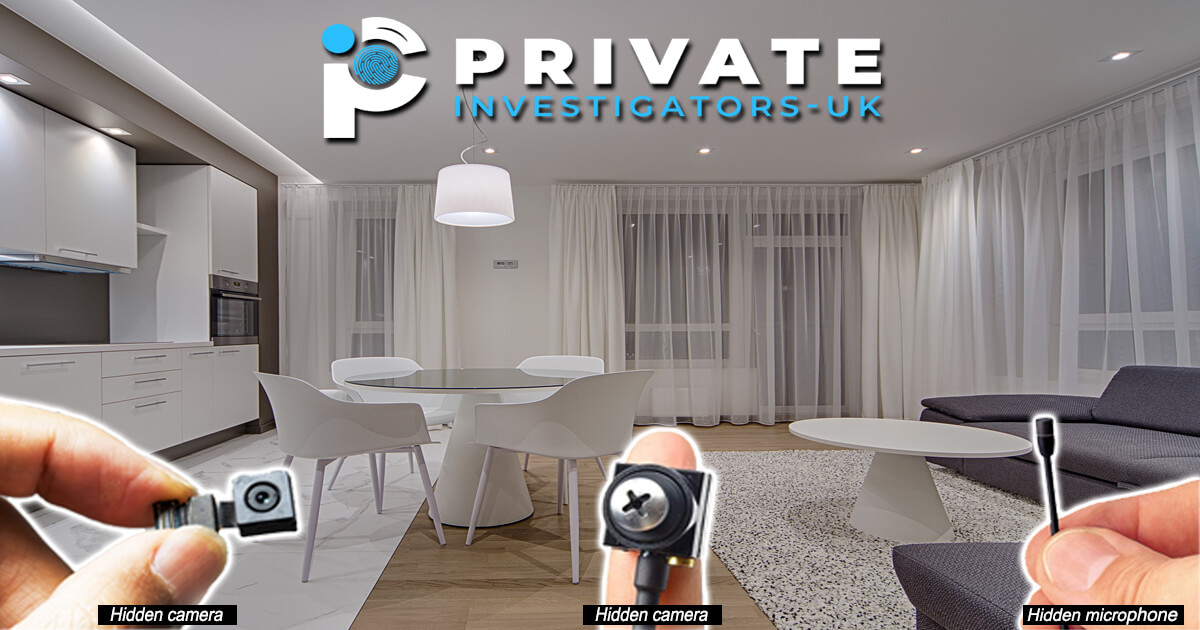
Can private investigators serve legal documents?
Yes. Process serving is a standard PI service. Documents include:
- Divorce papers
- Court summons
- Non-molestation orders
- Statutory demands and bankruptcy petitions
Private investigators ensure documents are served correctly and provide Statements of Service for court.
Can private investigators access criminal records?
No. Investigators cannot access police or government databases. Criminal records are confidential. What we can do is research open-source information like court listings, news reports, and public registers. Combined with OSINT, this builds a clear profile without breaking the law.
Contact PrivateInvestigators-UK
If you need surveillance, GPS tracking, process serving, bug sweeps, or OSINT background checks, our team can help. Visit our homepage or get in touch for a confidential consultation.
Related articles
- GPS tracker FAQ: Is it legal to fit GPS trackers in the UK?
- Can private investigators trace IP addresses?
- Can private investigators hack phones or social media?
Do Private Investigators Work for Authorities in the UK?
April 27, 2022 - Reading time: 10 minutes
Updated on: September 4, 2025
As the name suggests, private investigators primarily work for private individuals and businesses. Typical instructions include infidelity investigations, due diligence, tracing people, background checks, process serving, and surveillance. That said, the UK public sector sometimes instructs reputable agencies when specialist resource or speed is needed.
Because investigation is a broad field, there are many occasions where experienced PIs support public bodies and provide evidence that stands up to scrutiny, provided everything is done lawfully and proportionately.
Do private investigators work with councils in the UK?
Yes. Local authorities may instruct private investigators directly or via their solicitors in a range of scenarios:
Investigating benefit fraud and unlawful cohabitation
Where single-person discounts, council tax support, or housing benefit are suspected of being claimed unlawfully, councils sometimes commission cohabitation surveillance or lifestyle checks to support a decision. Lawful, time-stamped observations over multiple dates can help show a pattern rather than a one-off visit.
Process serving
Councils often outsource service of documents for cost and speed. Private investigators act as process servers and provide a court-ready Statement/Affidavit of Service. Many matters start with tracing to confirm a current address.
Licensing compliance checks
Test purchases and compliance visits help verify alcohol and tobacco licence conditions. PIs can evidence sales to under-18s, out-of-hours sales, or trading without a licence, acting as impartial third parties.

Fly-tipping investigations
Private investigators can carry out surveillance at hot spots and deploy unmanned camera equipment where lawful. Evidence helps identify vehicles, timings, and repeat offenders so the council can take action and reduce clean-up costs.
Personal injury and insurance claims
For claims made against councils, investigators may verify the consistency of reported injuries. If a claimant alleging mobility issues is recorded undertaking strenuous activity, the council’s legal team can use that footage to assess the case.
Background checks and internal matters
Where enhanced vetting is prudent, PIs can add OSINT-led reputation checks, open-source court appearance searches, and social media reviews to standard HR screening. They can also examine fraudulent sick leave, theft, moonlighting, and conflicts of interest in a fair, documented manner.
Do private investigators work for solicitors in the UK
Yes. Solicitors frequently use private investigators to gather evidence for civil, family, and commercial cases. Typical instructions include surveillance, witness enquiries, process serving, tracing debtors, asset checks, and background investigations. As lawyer Kate McMahon noted in a BBC piece, some firms “use private investigators for almost every case” (source).
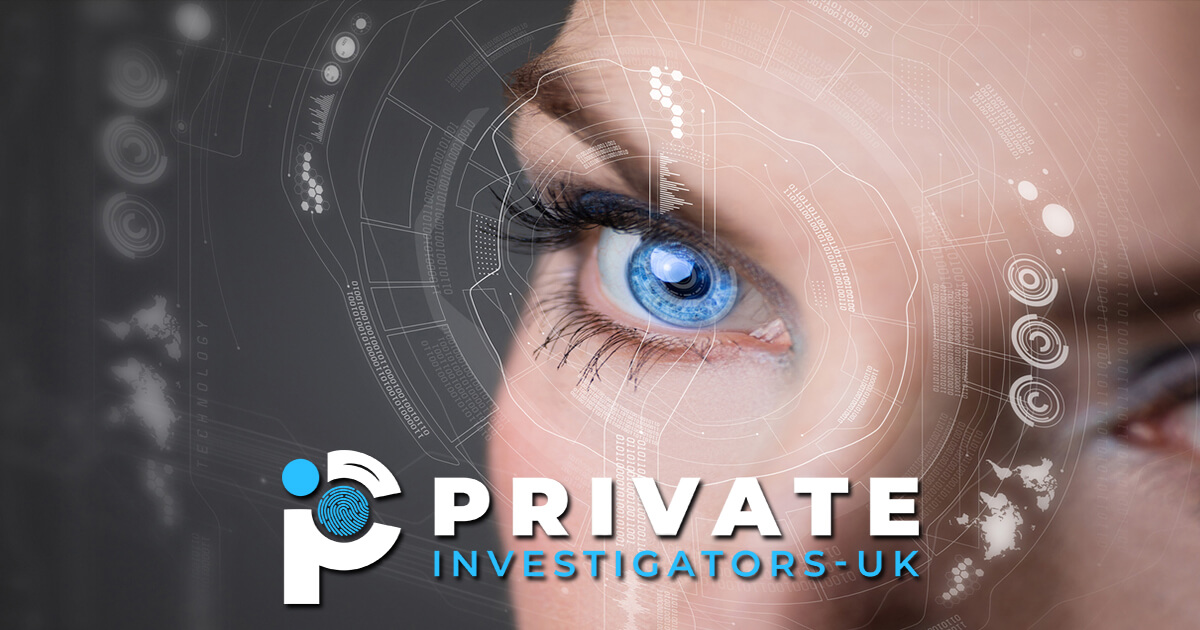
Do private investigators work for police in the UK
Direct employment by police is less common, but collaboration exists. Some forces have trialled hiring civilians and PIs for lower-risk tasks like witness statements and interviews. For example, reports in 2017 suggested Thames Valley Police recruited PIs for certain duties during budget pressure (source). Many PIs are ex-law enforcement, so skills can overlap.
Typical services a UK PI can provide to public bodies
- Surveillance and observations with time/date-stamped footage and logs
- Process serving with Statements/Affidavits of Service
- Tracing and people-finding using lawful OSINT and enquiries
- Background and reputation checks including open-source court listings
- Test purchases and licensing compliance checks
- Evidence packs suitable for council hearings or court
Compliance, proportionality, and standards
Good investigation work is lawful, necessary, and proportionate. That means clear instructions, minimal intrusion, and strong evidence handling. Although the UK has no central licensing regime for PIs, reputable firms operate under data protection law and follow recognised codes of practice. Councils and solicitors should expect:
- Clear scope, risk assessment, and lawful basis
- Minimal collection focused on the objective
- Secure handling and retention of evidence
- Concise, court-ready reporting
Speak to Private Investigators UK
If you represent a council, solicitor, or public body and need surveillance, process serving, tracing, or background checks, we can help. We operate nationwide and handle instructions quickly and discreetly. Contact our team for a no-pressure quote.
Related articles
- Why private investigators use drones in the UK
- How private investigators help solicitors
- Are private investigators licensed in the UK
How Private Investigators Catch Cheating Partners
April 23, 2022 - Reading time: 12 minutes
Updated on: September 3, 2025
As one of the UK's leading private detective agencies, we provide surveillance, background checks, process serving, and OSINT investigations. Infidelity investigations are among the most requested. If uncertainty is affecting your wellbeing, a professional investigator can help you get clear answers and usable evidence.
Quick Navigation
In this guide, we outline the most effective methods private investigators use to uncover infidelity and how they fit together in a discreet, lawful plan.
1. Personal Surveillance
Surveillance is the backbone of most cheating partner cases. Operatives discreetly observe a subject and gather time stamped photos and video of movements and meetings.
- Static surveillance at a property or venue from a fixed position.
- Mobile surveillance following the subject by vehicle, on foot, or via public transport.
Mobile work is far more effective with two or more operatives, especially in busy areas or when subjects use multiple transport modes. That said, a skilled single agent can still achieve strong results with tight planning and realistic objectives.
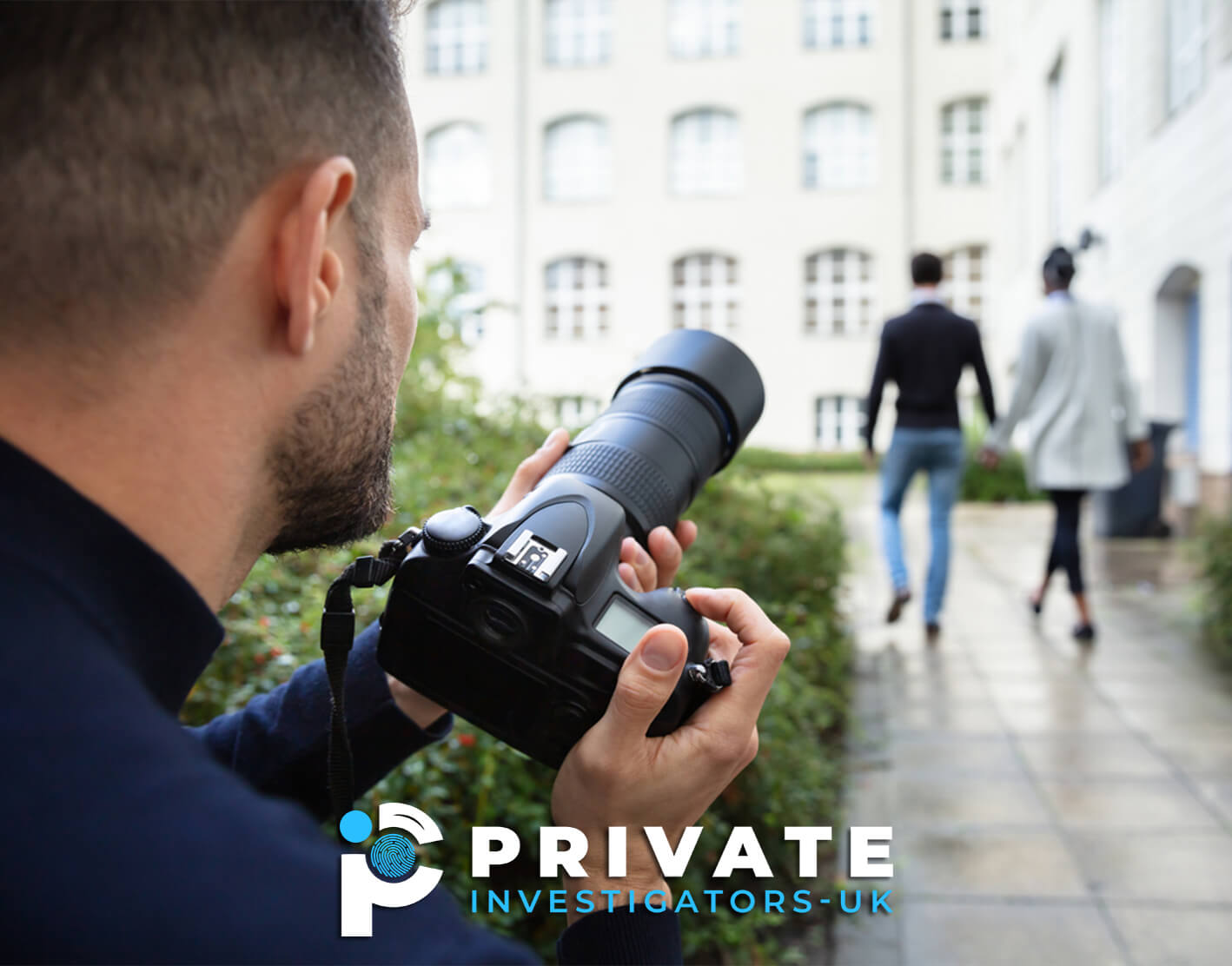
2. GPS Tracking Devices
GPS trackers can pinpoint where a vehicle goes and when, which helps schedule surveillance at the most likely times and places. This often reduces overall hours and cost. Trackers may also be used alone to verify a partner's claimed schedule.
![]()
Read more about the legalities here: GPS tracking in the UK, or contact us for a free consultation.
3. Honeypot Investigations
Honeypot investigations use a trained decoy to test fidelity in a controlled, recorded interaction. Scenarios are tailored to the subject and can occur in bars, gyms, hotels, or online.
- Careful selection of decoy profile aligned to known preferences.
- Clear limits and consent from the client on what is attempted.
- Evidence captured as screenshots, chat logs, and video where lawful.
Honeypots can confirm a pattern quickly, but they should sit alongside surveillance or OSINT to form a fair and balanced picture.
4. OSINT Investigations (Open Source Intelligence)
OSINT examines a person's online footprint to uncover risk signals that point to infidelity or secret lifestyles.
- Profiles on dating sites and apps, including accounts under variations of name.
- Alternate social media identities and hidden friend lists.
- Public photos, venue check ins, and patterns that conflict with stated schedules.
OSINT is discreet and cost effective and often guides where and when to deploy surveillance.
Should You Hire a Private Investigator?
It depends on your needs. Many clients find that verified facts reduce anxiety and help them decide whether to repair or end the relationship. Our investigators work confidentially and with sensitivity. If the goal is legal action later, we also ensure evidence is preserved and documented properly.
How Much Does It Cost?
Costs vary by location, complexity, available intelligence, and the number of operatives required. A focused plan that uses GPS or OSINT to target the best windows often lowers the hours needed on the ground.
See our detailed guide: How much does it cost to catch a cheating partner?
Signs That Your Partner Might Be Cheating
Watch for clusters of behaviour, not single incidents. Sudden schedule changes, secrecy around devices, unexplained spending, and distancing can indicate a problem. For a fuller list, see 10 Surprising Red Flags Your Partner is Cheating on You.
Legal Notes in the UK
- We only use lawful, proportionate methods. No hacking, no pretexting banks, no access to private records without authority.
- Surveillance is conducted in public places or with permission where required.
- If you anticipate court, ask for an evidence pack with statements, exhibits, and chain of custody.
Our UK based team can plan a discreet infidelity investigation using targeted surveillance, GPS intelligence, and OSINT. We also offer process serving if your case escalates to legal action. Request a free, no obligation quote.
Frequently Asked Questions
How long does an infidelity investigation take?
Simple cases can be resolved quickly if there are clear patterns to target. Complex cases or those involving trips away can take longer and may need multiple surveillance windows.
Will my partner find out?
Professional work is covert. If no action follows, the subject will not usually know an investigation took place.
Do photos and video hold up in court?
Yes when gathered lawfully and presented correctly. Ask for an evidence bundle if you intend to use the findings in legal proceedings.
Is GPS tracking legal?
It depends on ownership, consent, and circumstances. See our guidance on GPS tracker legality in the UK and speak to us for case specific advice.
Related articles
What do Background Checks in the UK Include?
March 16, 2022 - Reading time: 10 minutes
Updated on: September 4, 2025
As a leading detective agency based in the UK, our clients often ask us to carry out background checks on individuals. Background checks are useful in a wide range of different circumstances, such as:
- Pre-employment screening to check the suitability of prospective employees
- Relationship background checks to examine your partner’s history
- Checking a relative’s new partner
- Investigating an ex-partner’s new partner to ensure they are safe to be around your children
What do background checks actually include?
Background checks come in various forms. In general, when you request a background check in the UK, it may include the following:
- Verification of the subject’s personal details: This may include their full name, address, contact details, date of birth, marriage or death verification, national insurance number (if known), passport information (if known), and driving licence details (where provided). These checks help confirm that the person is who they claim to be.
- Criminal history research: While it is not possible to obtain someone’s official criminal record without their consent, we may be able to identify relevant history through open-source intelligence (OSINT). This can include researching court appearances, media reports, and legal listings to flag any past involvement in criminal or civil proceedings.
- Financial background checks: Bankruptcy and insolvency records, credit checks (where legally permitted), County Court Judgments (CCJs), and debt-related information. This helps assess whether the subject is in financial distress or appears financially stable.
Enhanced background checks
Enhanced background checks include everything in the standard checks, plus the following:
- Social media and digital footprint check: Identification of online profiles and activity linked to the subject, including any concerning posts or connections.
- International sanctions and watch list checks: Identification of any listings under international law enforcement, banking, or governmental bodies.
- Business interests and directorship search: Are they involved in any UK or international businesses? We check Companies House and other business registers.
- Reputation and negative publicity: Searching news archives and online platforms for press coverage or public allegations involving the subject.
- Address history trace: Compilation of previously linked addresses and cohabitants where available, helping to establish residency patterns.
Online dating background checks
Introducing someone from an app into your life carries risk. Romance fraud, catfishing, and misrepresentation are common. A discreet online dating background check helps confirm identity and spot red flags before you invest time, emotion, or money.
What we can check
- Identity and photo verification: Cross-check names, claimed age, and location against independent sources. Reverse image review to spot stock photos or borrowed pictures.
- Relationship status indicators: Open-source checks for signs of a current partner or recent cohabitation. We never break into private accounts.
- Court listings and news mentions: Publicly available civil or criminal court appearances, protective orders reported by media, and adverse press.
- Employment and qualifications: Light-touch verification of claimed roles, companies, and education using lawful sources.
- Financial risk markers: Insolvency, CCJs, and similar public records that can indicate vulnerability to, or patterns of, financial issues.
- Digital footprint and social media: Presence across platforms, inconsistent personas, concerning posts, or multiple aliases.
Romance fraud red flags
- Refuses video calls or in-person meetings after weeks of contact
- Asks for money, crypto, gift cards, or “urgent fees”
- Stories that change, pressure to move chats off the app, or secrecy demands
- Photos that trace to models or unrelated profiles
If your gut says something is off, it usually is. We can assess risk quickly and confidentially. For a tailored dating safety check, get in touch.
If you would like a free quote for a background check, then please get in touch with us and let us know which exact checks you would like us to perform.

Why do people run background checks?
There are many reasons someone might want to run a background check on another individual. Whether it’s for personal safety, family reassurance, or business due diligence, background screening can play a key role in decision-making. In today’s world, it's simply wise to take precautions before allowing someone new into your life or organisation.
A background check can raise red flags that might not be visible on the surface. Or, it can offer confirmation that everything is as it should be. Either way, it provides valuable peace of mind.
Employment background screening
More and more UK employers are now using pre-employment checks to avoid costly mistakes. Employment background screening helps reduce the risk of hiring someone with a problematic history, and it also protects your company’s reputation.
Typically, this includes identity verification, previous employment checks, and criminal history research where permitted. Many companies also request social media checks and online reputation reviews to assess a candidate’s character and past conduct.
Personal background screening
If you’re concerned about someone new in your personal life, whether it’s a partner, friend, or your child’s new step-parent, a personal background check can offer vital reassurance. These are often used to check a partner’s past or investigate someone close to a loved one.
We are frequently asked to perform checks on individuals entering a client’s family circle — such as a daughter’s new boyfriend or a parent’s new partner. If you’re wondering how to check someone’s background in the UK discreetly, this service is for you.
Whether you’re acting on suspicion or just instinct, running a background check is often a responsible and proactive step. It can help safeguard those you care about.
Why choose PrivateInvestigators-UK for your background checks?
At PrivateInvestigators-UK, we provide a tailored and discreet background check service across the UK. We pride ourselves on close personal communication with every client. We listen to your specific needs and recommend the most effective, legal and affordable solution.
Please visit our homepage for more about us, or feel free to get in touch for a free background check quote today.
Related articles
You are reading the PrivateInvestigators-UK blog — home to the UK's leading detective agency. Learn more about us by visiting our homepage PrivateInvestigators-UK.com.